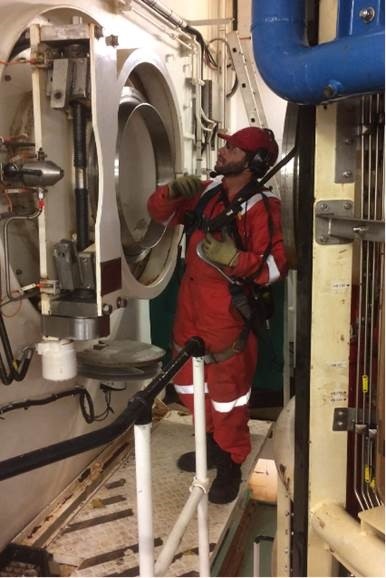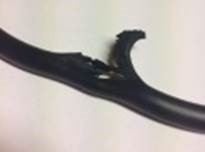Diving bell TUP O-ring seal damage
What happened
During the locking on of the diving bell to the saturation system on a DSV, difficulty was encountered in closing the locking clamp. After a few attempts, the clamp was successfully closed and the interlock pin inserted proving correct closure of the clamp. During pressurisation of the trunking a leak was detected, the pressurisation stopped, and the clamp opened up for further inspection and fault finding. A damaged O ring was discovered and changed out. The bell was then successfully mated and the divers transferred to the living chambers.

What went wrong?
When the bell was trolleyed back and access platforms raised to access the sealing faces, the O ring seal was found to have been damaged. The O ring had become displaced prior to the bell mating, and a section of the O ring had come out of its groove. When the bell was mated, the O ring prevented the two faces from coming into correct alignment and the clamp would not close fully to allow the interlock to engage. During repeated clamp closures, the O ring was damaged but pushed back into the groove and until the clamp closed fully and the interlock engaged. The subsequent pressurisation procedure proved there was a leak past the O ring and the bell mating was ceased and the leak investigated.
What were the causes of the incident?
The incident was caused by the damage to an O ring which had become misplaced. The O ring seal had not been fully inspected either by sight or touch before the bell lock off and reconnection, and this misplacement had not been identified.
Access to carry out this full inspection was difficult requiring working at height equipment and was only carried out on a scheduled basis and not every bell run.

Lessons learnt and actions taken
- Lesson: Bell mating flanges and seals should be inspected between every bell run to ensure they are in correct location and in good condition;
- Actions taken:
- a process is now in place requiring the inspection and recording of the bell mating flange faces and seals;
- access has been improved to carry out this task without the need for specialist work methods and associated personal protective equipment (PPE).
Members may also wish to refer to Uncontrolled decompression of diving bell
Safety Event
Published: 3 May 2017
Download: IMCA SF 09/17
IMCA Safety Flashes
Submit a Report
IMCA Safety Flashes summarise key safety matters and incidents, allowing lessons to be more easily learnt for the benefit of all. The effectiveness of the IMCA Safety Flash system depends on Members sharing information and so avoiding repeat incidents. Please consider adding safetyreports@imca-int.com to your internal distribution list for safety alerts or manually submitting information on incidents you consider may be relevant. All information is anonymised or sanitised, as appropriate.
IMCA’s store terms and conditions (https://www.imca-int.com/legal-notices/terms/) apply to all downloads from IMCA’s website, including this document.
IMCA makes every effort to ensure the accuracy and reliability of the data contained in the documents it publishes, but IMCA shall not be liable for any guidance and/or recommendation and/or statement herein contained. The information contained in this document does not fulfil or replace any individual’s or Member's legal, regulatory or other duties or obligations in respect of their operations. Individuals and Members remain solely responsible for the safe, lawful and proper conduct of their operations.
